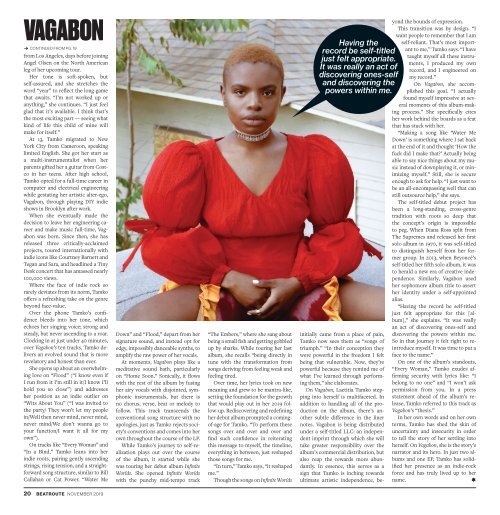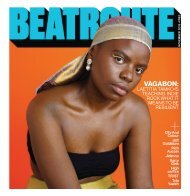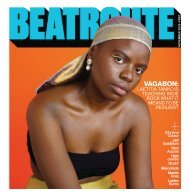BeatRoute Magazine BC Edition - November 2019
BeatRoute Magazine is a music monthly and website that also covers: fashion, film, travel, liquor and cannabis all through the lens of a music fan. Distributed in British Columbia and Alberta, Ontario edition coming Thursday, October 4, 2019. BeatRoute’s Alberta edition is distributed in Calgary, Edmonton, Banff and Canmore. The BC edition is distributed in Vancouver, Victoria and Nanaimo. BeatRoute (AB) Mission PO 23045 Calgary, AB T2S 3A8 E. editor@beatroute.ca BeatRoute (BC) #202 – 2405 E Hastings Vancouver, BC V5K 1Y8 P. 778-888-1120
BeatRoute Magazine is a music monthly and website that also covers: fashion, film, travel, liquor and cannabis all through the lens of a music fan. Distributed in British Columbia and Alberta, Ontario edition coming Thursday, October 4, 2019. BeatRoute’s Alberta edition is distributed in Calgary, Edmonton, Banff and Canmore. The BC edition is distributed in Vancouver, Victoria and Nanaimo. BeatRoute (AB) Mission PO 23045 Calgary, AB T2S 3A8 E. editor@beatroute.ca BeatRoute (BC) #202 – 2405 E Hastings Vancouver, BC V5K 1Y8 P. 778-888-1120
Create successful ePaper yourself
Turn your PDF publications into a flip-book with our unique Google optimized e-Paper software.
VAGABON<br />
k CONTINUED FROM PG. 19<br />
initially came from a place of pain,<br />
Tamko now sees them as “songs of<br />
triumph.” “In their conception they<br />
were powerful in the freedom I felt<br />
being that vulnerable. Now, they’re<br />
powerful because they remind me of<br />
what I’ve learned through performing<br />
them,” she elaborates.<br />
On Vagabon, Laetitia Tamko stepping<br />
into herself is multifaceted. In<br />
addition to handling all of the production<br />
on the album, there’s another<br />
subtle difference in the liner<br />
notes. Vagabon is being distributed<br />
under a self-titled LLC: an independent<br />
imprint through which she will<br />
take greater responsibility over the<br />
album’s commercial distribution, but<br />
also reap the rewards more abundantly.<br />
In essence, this serves as a<br />
sign that Tamko is inching towards<br />
ultimate artistic independence, befrom<br />
Los Angeles, days before joining<br />
Angel Olsen on the North American<br />
leg of her upcoming tour.<br />
Her tone is soft-spoken, but<br />
self-assured, and she stretches the<br />
word “year” to reflect the long-game<br />
that awaits. “I’m not worked up or<br />
anything,” she continues. “I just feel<br />
glad that it’s available. I think that’s<br />
the most exciting part — seeing what<br />
kind of life this child of mine will<br />
make for itself.”<br />
At 13, Tamko migrated to New<br />
York City from Cameroon, speaking<br />
limited English. She got her start as<br />
a multi-instrumentalist when her<br />
parents gifted her a guitar from Costco<br />
in her teens. After high school,<br />
Tamko opted for a full-time career in<br />
computer and electrical engineering<br />
while gestating her artistic alter-ego,<br />
Vagabon, through playing DIY indie<br />
shows in Brooklyn after work.<br />
When she eventually made the<br />
decision to leave her engineering career<br />
and make music full-time, Vagabon<br />
was born. Since then, she has<br />
released three critically-acclaimed<br />
projects, toured internationally with<br />
indie icons like Courtney Barnett and<br />
Tegan and Sara, and headlined a Tiny<br />
Desk concert that has amassed nearly<br />
100,000 views.<br />
Where the face of indie rock so<br />
rarely deviates from its norm, Tamko<br />
offers a refreshing take on the genre<br />
beyond face-value.<br />
Over the phone Tamko’s confidence<br />
bleeds into her tone, which<br />
echoes her singing voice; strong and<br />
steady, but never ascending to a roar.<br />
Clocking in at just under 40 minutes,<br />
over Vagabon’s ten tracks, Tamko delivers<br />
an evolved sound that is more<br />
revelatory and honest than ever.<br />
She opens up about an overwhelming<br />
love on “Flood” (“I know even if<br />
I run from it I’m still in it/I know I’ll<br />
hold you so close”) and addresses<br />
her position as an indie outlier on<br />
“Wits About You” (“I was invited to<br />
the party/ They won’t let my people<br />
in/Well then never mind, never mind,<br />
never mind/We don’t wanna go to<br />
your function/I want it all for my<br />
own”).<br />
On tracks like “Every Woman” and<br />
“In a Bind,” Tamko leans into her<br />
indie roots, pairing gently ascending<br />
strings, rising tension, and a straightforward<br />
song structure, similar to Bill<br />
Callahan or Cat Power. “Water Me<br />
Down” and “Flood,” depart from her<br />
signature sound, and instead opt for<br />
edgy, impossibly danceable synths, to<br />
amplify the raw power of her vocals.<br />
At moments, Vagabon plays like a<br />
meditative sound bath, particularly<br />
on “Home Soon.” Sonically, it flows<br />
with the rest of the album by fusing<br />
her airy vocals with disjointed, symphonic<br />
instrumentals, but there is<br />
no chorus, verse, beat or melody to<br />
follow. This track transcends the<br />
conventional song structure with no<br />
apologies, just as Tamko rejects society’s<br />
conventions and comes into her<br />
own throughout the course of the LP.<br />
While Tamko’s journey to self-realization<br />
plays out over the course<br />
of the album, it started while she<br />
was touring her debut album Infinite<br />
Worlds. She opened Infinite Worlds<br />
with the punchy mid-tempo track<br />
“The Embers,” where she sang about<br />
being a small fish and getting gobbled<br />
up by sharks. While touring her last<br />
album, she recalls “being directly in<br />
tune with the transformation from<br />
songs deriving from feeling weak and<br />
feeling tired.<br />
Over time, her lyrics took on new<br />
meaning and grew to be mantra-like,<br />
setting the foundation for the growth<br />
that would play out in her <strong>2019</strong> follow-up.<br />
Rediscovering and redefining<br />
her debut album prompted a comingof-age<br />
for Tamko. “To perform these<br />
songs over and over and over and<br />
find such confidence in reiterating<br />
this message to myself, the timeline,<br />
everything in between, just reshaped<br />
those songs for me.<br />
“In turn,” Tamko says, “it reshaped<br />
me.”<br />
Though the songs on Infinite Worlds<br />
Having the<br />
record be self-titled<br />
just felt appropriate.<br />
It was really an act of<br />
discovering ones-self<br />
and discovering the<br />
powers within me.<br />
yond the bounds of expression.<br />
This transition was by design. “I<br />
want people to remember that I am<br />
self-reliant. That’s most important<br />
to me,” Tamko says. “I have<br />
taught myself all these instruments,<br />
I produced my own<br />
record, and I engineered on<br />
my record.”<br />
On Vagabon, she accomplished<br />
this goal. “I actually<br />
found myself impressive at several<br />
moments of this album-making<br />
process.” She specifically cites<br />
her work behind the boards as a feat<br />
that has stuck with her.<br />
“Making a song like ‘Water Me<br />
Down’ is something where I sat back<br />
at the end of it and thought ‘How the<br />
fuck did I make that?’ Actually being<br />
able to say nice things about my music<br />
instead of downplaying it, or minimizing<br />
myself.” Still, she is secure<br />
enough to ask for help. “I just want to<br />
be an all-encompassing well that can<br />
still outsource help,” she says.<br />
The self-titled debut project has<br />
been a long-standing, cross-genre<br />
tradition with roots so deep that<br />
the concept’s origin is impossible<br />
to peg. When Diana Ross split from<br />
The Supremes and released her first<br />
solo album in 1970, it was self-titled<br />
to distinguish herself from her former<br />
group. In 2013, when Beyoncé’s<br />
self-titled her fifth solo album, it was<br />
to herald a new era of creative independence.<br />
Similarly, Vagabon used<br />
her sophomore album title to assert<br />
her identity under a self-appointed<br />
alias.<br />
“Having the record be self-titled<br />
just felt appropriate for this [album],”<br />
she explains. “It was really<br />
an act of discovering ones-self and<br />
discovering the powers within me.<br />
So in that journey it felt right to reintroduce<br />
myself. It was time to put a<br />
face to the name.”<br />
On one of the album’s standouts,<br />
“Every Woman,” Tamko exudes affirming<br />
security with lyrics like: “I<br />
belong to no one” and “I won’t ask<br />
permission from you. In a press<br />
statement ahead of the album’s release,<br />
Tamko referred to this track as<br />
Vagabon’s “thesis.”<br />
In her own words and on her own<br />
terms, Tamko has shed the skin of<br />
uncertainty and insecurity in order<br />
to tell the story of her settling into<br />
herself. On Vagabon, she is the story’s<br />
narrator and its hero. In just two albums<br />
and one EP, Tamko has solidified<br />
her presence as an indie-rock<br />
force and has truly lived up to her<br />
name. ,<br />
20 BEATROUTE NOVEMBER <strong>2019</strong>

















